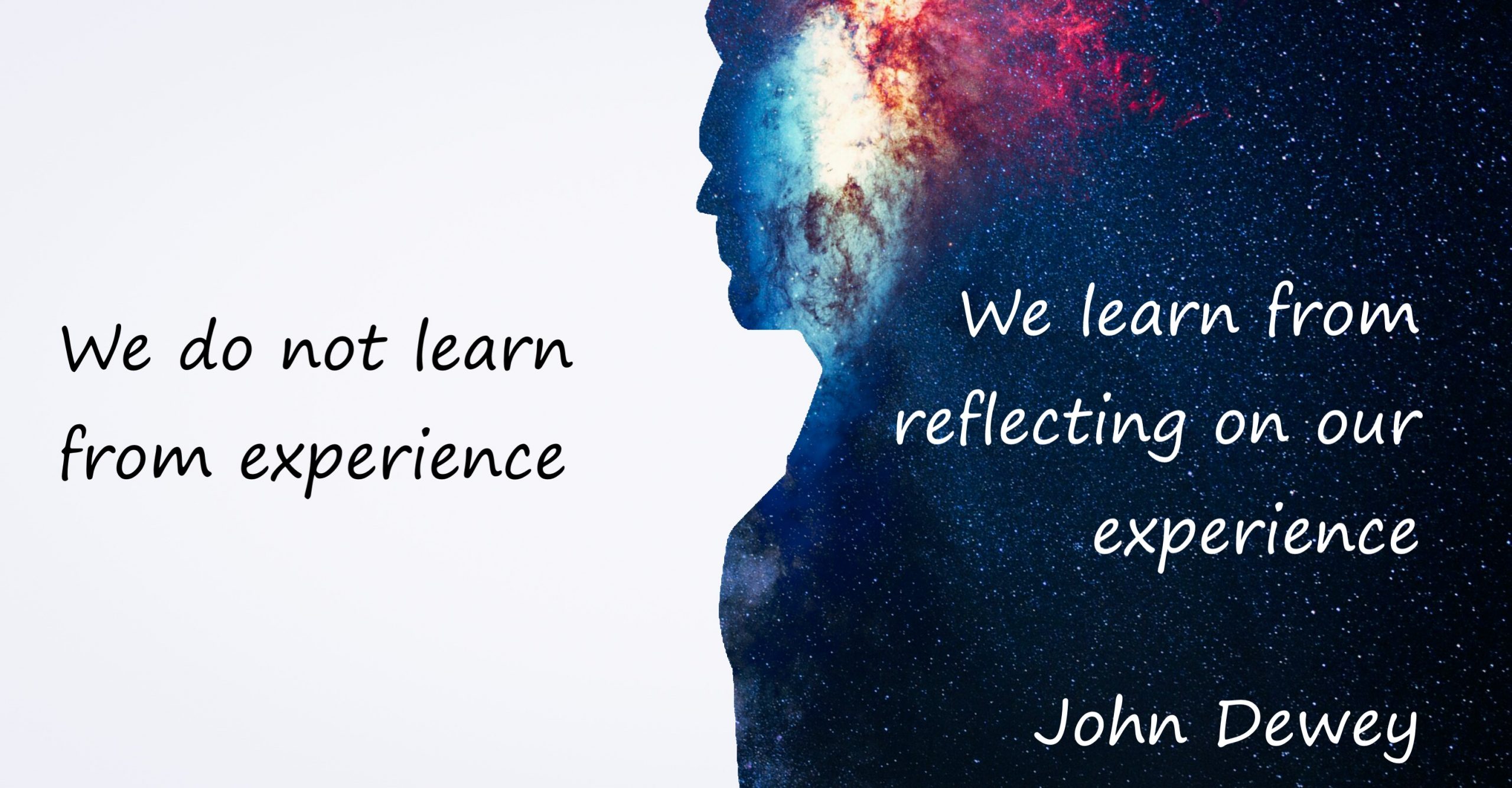Reflection Journaling
Section audio
Earlier, this textbook claimed that experience was one of the most effective ways to develop wisdom. This sentiment is, alas, somewhat inaccurate. We do not learn through experience but by reflecting on our experience.
“Reflection” by Brad C. Anderson is licensed under CC BY 4.0 / A derivative from the original work
Reflection journals are a tool to facilitate the contemplation of our actions and their outcomes. The following sections describe the methods based on several sources, but you may adapt them to your needs.[1][2][3][4][5][6]
When making journal entries, you may use text, audio, video, or whatever format you prefer. What is important is your ability to record your reflections so that you can come back and easily review them at a later date.
What to Include in Your Journal
Regularly (several times a week)
Describe the event:
Describe events that occur during your day. Focus on the actions you take and the decisions you make. Include meaningful discussions, disagreements, and so on. Record successes and things that trouble you.
State the rationale for your actions:
What were you thinking? Why did you act the way you did? Be sure to address the following elements as you discuss your rationale.
- Values: What values does your action express?
- Emotions: This is a big one. We like to think we are rational performance machines. In reality, we often make decisions based on our feelings. Reflect on what you were feeling during the event you described. It is critical to reflect on how those emotions influenced your actions. The goal is not to eliminate your feelings but to gain insight into how your emotions affect your performance.
- Rationale: What was the intellectual underpinning of your actions? What was the type of rationality you relied on (e.g., technocratic, body, bureaucratic, etc.)?
- Assumptions: What assumptions were implicit in the choices you made?
What was influencing other individuals in the encounter:
If your event involved other people, what do you believe was driving their actions? What values, emotions, and rationale do you think influenced them?
Short term outcome:
What was the immediate result of your actions? Are you happy with the outcome? If yes, what was the key to achieving that outcome? If no, what prevented you from getting the result you wanted?
Short term lessons learned:
Did you get any insights from this experience? Highlight them so you can easily refer back to them later.
Action items:
Based on the above reflection, are there any actions you need to take?
Periodically (every three to four months)
Review your journal:
Scan through your journal every few months.
Long-term outcomes:
Assessing the long term effects of our actions is critical yet easy for us to ignore. Our efforts have long-lasting effects. We need to teach ourselves to see these consequences. Now that time has passed since your initial decision, are there any long-term consequences to note? Are you happy with those long-term effects? Why or why not?
Trends:
Do you notice any trends in your behaviour? Does the same situation arise frequently? Do you make the same mistakes time and again? Is there a system you can put in place to address these recurring issues?
Long-term lessons learned:
Based on the above reflection, are there additional lessons you have learned? Highlight critical learnings so you can remind yourself of them often.
Action items:
Identify any actions you need to take based on these long-term lessons you learned.
Key Takeaways
- We do not learn from experience but from reflecting on our experience.
- Reflection journals are a tool to facilitate the contemplation of our actions and their outcomes.
- Reflect regularly through the week on your actions and the values, assumptions, and rationale behind your decisions
- Periodically through the year, revisit your reflections to pull out recurring themes in your performance and decision-making.
- Adler, N. J. (2007). Organizational Metaphysics–Global Wisdom and the Audacity of Hope. In E. H. Kessler & J. R. Bailey (Eds.), Handbook of Organizational and Managerial Wisdom (pp. 423–458). Thousand Oaks, CA: Sage Publications Inc. ↵
- Coulson, D., & Harvey, M. (2013). Scaffolding student reflection for experience-based learning: A framework. Teaching in Higher Education, 18(4), 401–413. ↵
- Gardner, H. (2011). Leading Minds: An Anatomy of Leadership. New York: Basic Books. ↵
- Harvey, M., Coulson, D., & McMaugh, A. (2016). Towards a theory of the Ecology of Reflection: Reflective practice for experiential learning in higher education. Journal of University Teaching & Learning Practice, 13(2). ↵
- Kessler, E. H., & Bailey, J. R. (2007). Introduction–Understanding, Applying, and Developing Organizational and Managerial Wisdom. In E. H. Kessler & J. R. Bailey (Eds.), Handbook of Organizational and Managerial Wisdom (pp. xv–lxxiv). Thousand Oaks, CA: Sage Publications Inc. ↵
- Schön, D. A. (1983). The Reflective Practitioner: How Professionals Think in Action. Basic Books. ↵


